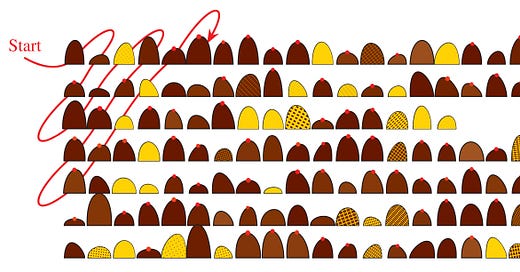The Chocolatier's game
The Chocolatier successively serves up an endless parade of exquisite, delectable morsels, while the Glutton aims to eat them all. Who will win?
Let us consider the Chocolatier's game, an infinite game played between two players, the Chocolatier and the Glutton. On each move, the Chocolatier serves up finitely many unique, exquisite chocolate creations on a platter, from which the Glutton selects one to eat. Play continues in just that way—at each stage the Chocolatier adds finitely many additional chocolates to the platter, and the Glutton consumes one of those available. Uneaten chocolates, if any, simply accumulate on the serving platter, available for the Glutton to select at later rounds.
After infinitely many rounds, one for each natural number, the Glutton wins if he has eaten all the chocolate, that is, if every chocolate that was ever served was also eventually consumed. Otherwise, if there are any chocolates left uneaten, the Chocolatier wins.
What? How could the Glutton possibly win? After all, the Chocolatier can be placing huge numbers of chocolates on the platter each round, while the Glutton eats only one. Won't the Glutton get steadily further and further behind?
Question. Who wins the Chocolatier's game? Does the Chocolatier or the Glutton have a winning strategy?
Interlude
Join me in analyzing this game and several variations. We shall introduce the distinction between strategies and tactics, including no-recall strategies and nearly no-recall strategies. But we shall start slow and easy, with merely countably many chocolates, taken at first finitely at a time, but eventually we shall consider the subtleties arising with an uncountably creative Chocolatier, ultimately mounting an argument involving the axiom of choice and well orders of the chocolate types. Let’s get into it.
Keep reading with a 7-day free trial
Subscribe to Infinitely More to keep reading this post and get 7 days of free access to the full post archives.




